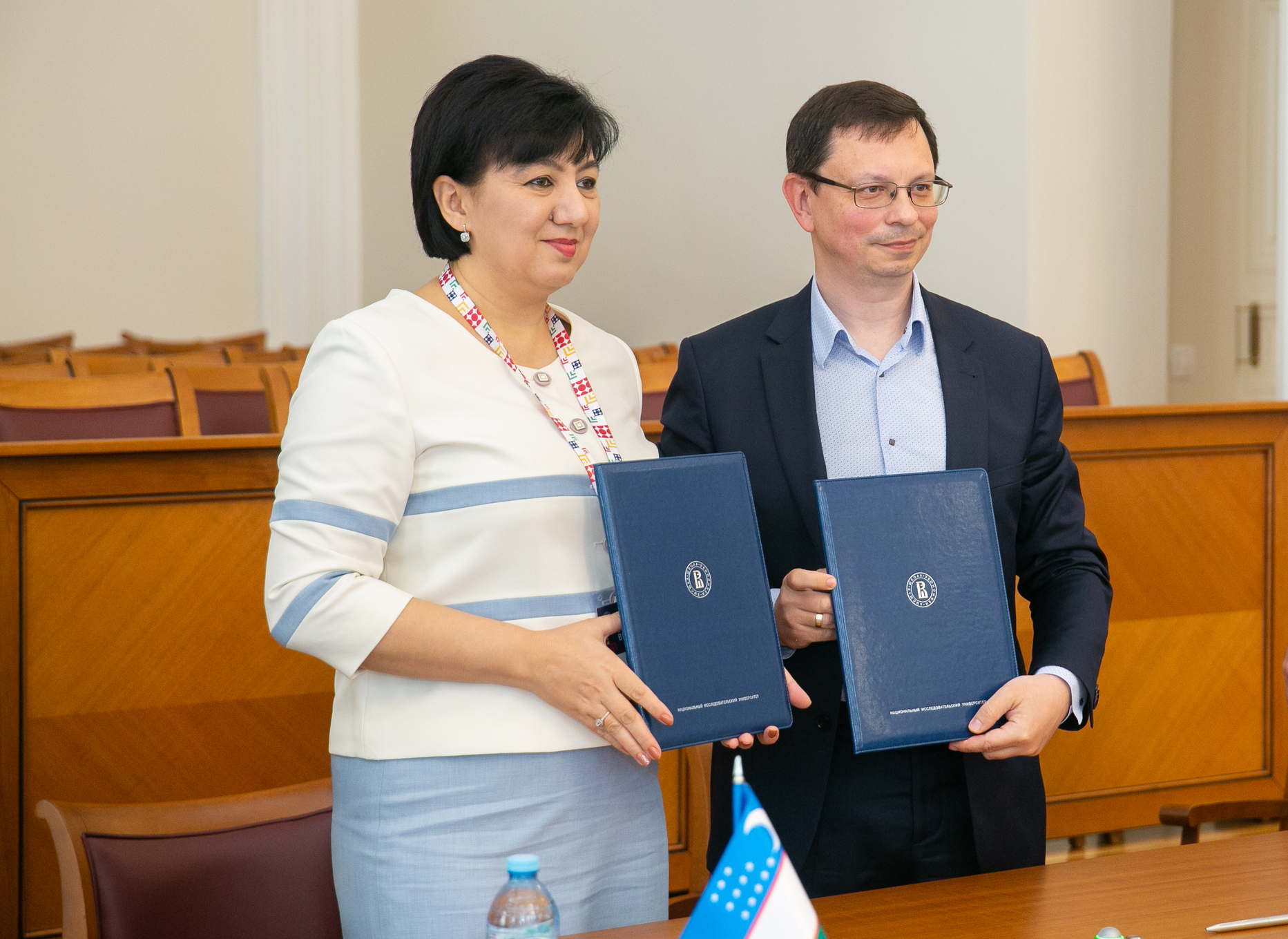‘30 Years Together’—International Partners’ Week Held at HSE University
HSE University in Moscow held the ‘30 Years Together’ International Partners’ Week. Embassy and university representatives from Armenia, Kazakhstan, Kyrgyzstan and Uzbekistan attended the opening meeting. Representatives of HSE campuses in Perm, Nizhny Novgorod, and St. Petersburg also took part in the event.
International Partners’ Week events cover all areas of university activity—from student mobility and double-degree programmes to joint research projects. HSE guests learnt about education and science at the university, and discussed potential joint academic projects and the prospects for developing a common academic Eurasian space.
The signing of the cooperation agreement between HSE University and Tashkent State University of Oriental Studies on June 14 was an important part of the International Partners’ Week. After signing the agreement, HSE Rector Nikita Anisimov presented a statuette of HSE’s mascot—the Crow—to Gulchehra Rikhsieva, Rector of the Tashkent State University of Oriental Studies. Gulchehra Rikhsieva, in turn, gave Nikita Anisimov a national souvenir plate, symbolizing the sun of the East.

‘This year HSE University turns 30 years old, so for us the International Partners’ Week feels like an anniversary event,’ said Anisimov. ‘Representatives of universities from CIS countries are here today—the 30th anniversary of this commonwealth was celebrated six months ago. The number of our partners in Azerbaijan, Armenia, Belarus, Kazakhstan, Uzbekistan, Moldova, Tajikistan is also 30. We are expanding cooperation; holding joint Olympiads, various schools, internships, and conferences; and conducting joint research projects. We have joint research and publications, and interact in a large number of areas. I would like to thank all our partners and friends on behalf of the university. We’re in this together, and together we are incredibly strong.’
At the moment, 2,500 students from CIS countries are studying at HSE University, and in 2022 the university received more than 5,000 applications from foreign applicants, noted Nikita Anisimov.
Students from HSE partner universities also show great interest in the university, so further development of cooperation will include various joint events. ‘I expect that we will create opportunities for student mobility, we will hold joint schools and much more,’ explained Nikita Anisimov.
Gulchehra Rikhsieva wished HSE staff success in their work in these difficult times: ‘We wish you more academic and research prospects and educational contacts and that plans and ideas come to life. We also wish you further prosperity. 30 years is a mature age, implying success in creation, the creative search, understanding the path you’ve travelled and plans for further development. You can rightfully be proud of the bright pages in the university’s history, the names of those who were at the origins of its establishment and who continue to safeguard the prestige and relevance of your educational institution.’
The rector of Tashkent State University of Oriental Studies also added that HSE University has established itself as one of the most prestigious and unique educational institutions in Russia. ‘You managed to create a research school based on world standards and principles of economics from the very beginning,’ she said. ‘We are certain that your team will reach new frontiers of scientific and creative achievement and will make your contribution both to developing Russia’s economy and to strengthening friendly ties between our countries and scientists.’
The First Secretary of the Embassy of Uzbekistan, Fathullah Abdurakhmanov, also attended the opening meeting of International Partners’ Week. ‘We are ready to cooperate, work, and develop collaboration with HSE University,’ he said.

During the meeting, HSE Vice Rector Ivan Prostakov presented the university’s notable achievements to guests. ‘International applicants come to HSE University primarily from the post-Soviet space,’ he stressed. ‘Despite the fact that for many people HSE University remains an economic university, such areas as design, media communications, computer science, applied mathematics are in increasing demand among the applicants, which means that we are really gradually going beyond the traditional idea of our university.’

HSE Vice Rector Sergey Roshchin also noted that 50,000 students from four campuses—in Moscow, St. Petersburg, Perm, and Nizhny Novgorod, where almost all major subject areas apart from medicine are represented—currently study at HSE University. ‘I emphasize—all major areas. From this point of view, our university has long been a higher school not only of economics, not only of the socio-economic sciences and the humanities, but also computer science, fundamental mathematics, and engineering, which is actively developing,’ he said. ‘It includes design and other areas of contemporary art, a large number of diverse programmes that affect actively developing communication technologies, and natural sciences: physics, chemistry, biology, biotechnology, geography, and geoinformation systems.’
Sergey Roshchin spoke about the university's projects and research and educational products that would serve as a basis for further cooperation with international partners. They include both new degree programmes and individual courses, as well as teacher training and the transfer of educational technologies and techniques, which is an important part of the partnership.
The ‘30 Years Together’ International Partners’ Week was held through June 17. During this time, guests learned more about the university’s faculties and institutes, visited different HSE buildings, and communicated in an informal atmosphere.
Nikita Anisimov
HSE University Rector
Ivan Prostakov
HSE University Vice Rector
Sergey Roshchin
HSE University Vice Rector

